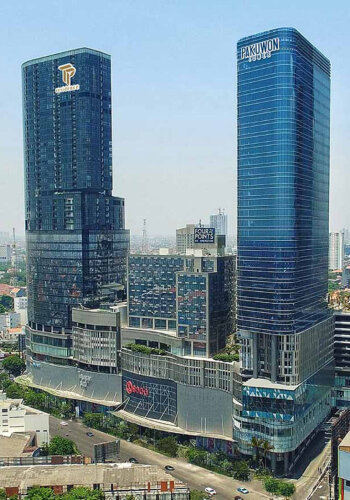Best Conveyancing Lawyers in Surabaya
Share your needs with us, get contacted by law firms.
Free. Takes 2 min.
Free Guide to Hiring a Real Estate Lawyer
List of the best lawyers in Surabaya, Indonesia
About Conveyancing Law in Surabaya, Indonesia
Conveyancing in Surabaya, Indonesia refers to the legal process of transferring property ownership from one party to another. This process involves a series of administrative and legal steps to ensure that property titles are correctly transferred and that both buyers and sellers meet all legal obligations. Conveyancing is essential for anyone acquiring or selling land, houses, or commercial properties. In Surabaya, conveyancing follows the guidelines set by the national and local regulations, including compliance with property registration, payment of relevant taxes, due diligence procedures, and completion of notarial deeds.
Why You May Need a Lawyer
Engaging a lawyer for conveyancing in Surabaya is highly recommended to minimize risk and avoid legal complications. Here are some common situations where legal help is essential:
- Buying or selling property: Lawyers ensure all legal documents are valid and accurately executed, minimizing the risk of future disputes.
- Handling inherited property: A lawyer can navigate inheritance laws and documentation to ensure a smooth transfer of property titles.
- Resolving property disputes: If there are competing claims over the land or unclear boundaries, legal assistance is crucial.
- Foreign ownership: Legal professionals can clarify regulations surrounding foreign property ownership and recommend appropriate structures for compliance.
- Mortgage and loan agreements: Lawyers help review and prepare documents related to financing property purchases.
Local Laws Overview
Conveyancing in Surabaya is primarily governed by Indonesia's Laws on Land Affairs (Agrarian Law) and National Land Agency (Badan Pertanahan Nasional or BPN) regulations. Here are some key aspects relevant to the city:
- Land Titles: The most common types are Hak Milik (Freehold), Hak Guna Bangunan (Right to Build), and Hak Pakai (Right to Use). Only Indonesian citizens can own Hak Milik land, while foreigners have restricted rights.
- Notarial Deed: Property transfers must be documented by an authorized Notary (Pejabat Pembuat Akta Tanah - PPAT) who draws up and registers the deed.
- Land Registration: All transactions must be recorded with the local BPN office to update the land book and issue a new certificate for the new owner.
- Taxes and Fees: Buyers and sellers are subject to various taxes, such as the land and building acquisition duty (BPHTB), income tax (PPh), and notarial fees.
- Due Diligence: Conducting a land search to verify the property status, absence of encumbrances, unpaid taxes, or disputes is a crucial step.
Frequently Asked Questions
What is the role of a Notary (PPAT) in property transactions in Surabaya?
The Notary or PPAT is responsible for drafting the official deed of sale and purchase, verifying the legal status of property, and ensuring that transactions comply with the law. The PPAT also submits the necessary documents to the National Land Agency for title transfer.
Can foreigners buy property in Surabaya?
Foreigners cannot own freehold land (Hak Milik) but may acquire rights such as Hak Pakai (Right to Use) or Hak Guna Bangunan (Right to Build), typically under strict conditions and only for certain property types.
What taxes and fees do I need to pay when buying property?
Main taxes include the land and building acquisition duty (BPHTB) typically paid by the buyer, and income tax (PPh) by the seller. There are also notary fees, administration costs at BPN, and other incidental expenses.
How long does the conveyancing process take in Surabaya?
The timeline can vary, but typically the process takes between one and three months, depending on due diligence, document completeness, and official processing times at the Notary and BPN.
Do I need to check the property's legal status before purchase?
Yes, due diligence is critical. It involves checking the land certificate, verifying the rightful owner, ensuring there are no pending disputes or unpaid taxes, and confirming zoning or land use compliance.
What documents are required for property transfer?
Commonly required documents include the land certificate, seller’s and buyer’s identification cards, family cards, taxpayer identification numbers, proof of payment of land and building tax, and other supporting documents relating to the property.
What happens if there is a dispute after the property transfer?
If disputes arise post-transfer, you should consult a lawyer specializing in property law. Solutions may include mediation, negotiation, or litigation depending on the case’s complexity.
How can I verify property ownership in Surabaya?
You can conduct a land search at the local BPN office or through your lawyer or Notary-PPAT to confirm the legal owner and to check for any encumbrances, outstanding taxes, or legal obstacles.
Can I complete the transaction without a lawyer?
While it is possible to proceed through a Notary or PPAT, hiring a lawyer provides additional legal protection, particularly when dealing with complex circumstances or disputes.
Are verbal property agreements legally valid?
No, property sales must be documented in an official deed prepared by a Notary or PPAT to be legally binding. Verbal agreements are not recognized by Indonesian property law.
Additional Resources
If you need further guidance or official information about conveyancing in Surabaya, consider the following resources:
- National Land Agency (BPN) - Surabaya Office: Handles land registration, certificates, and related services.
- Surabaya City Government (Pemerintah Kota Surabaya): Provides zoning and land-use regulations, local tax offices, and information on property transactions.
- Indonesian Notary Association (Ikatan Notaris Indonesia): Offers directories and information about registered Notaries and PPAT.
- Indonesian Advocates Association (Perhimpunan Advokat Indonesia): Provides information on finding qualified property lawyers.
- Local legal aid organizations: Can assist individuals who require help but have limited financial means.
Next Steps
If you are planning any property transaction in Surabaya, Indonesia, consider these steps:
- Gather Information: Collect all available documentation relating to the property and clarify your goals.
- Consult a Legal Professional: Engage a reputable property lawyer or Notary-PPAT familiar with local regulations to guide you through the process.
- Verify Property Status: Conduct due diligence to ensure there are no legal impediments, disputes, or unpaid taxes associated with the property.
- Budget for Expenses: Understand and prepare for all taxes, fees, and professional costs involved in the transaction.
- Complete Legal Formalities: Sign the deed before a Notary-PPAT and ensure the transfer is properly registered with the BPN to secure your legal rights.
Taking these steps with professional legal support will help you navigate the conveyancing process smoothly and protect your interests in Surabaya’s property market.
Lawzana helps you find the best lawyers and law firms in Surabaya through a curated and pre-screened list of qualified legal professionals. Our platform offers rankings and detailed profiles of attorneys and law firms, allowing you to compare based on practice areas, including Conveyancing, experience, and client feedback.
Each profile includes a description of the firm's areas of practice, client reviews, team members and partners, year of establishment, spoken languages, office locations, contact information, social media presence, and any published articles or resources. Most firms on our platform speak English and are experienced in both local and international legal matters.
Get a quote from top-rated law firms in Surabaya, Indonesia — quickly, securely, and without unnecessary hassle.
Disclaimer:
The information provided on this page is for general informational purposes only and does not constitute legal advice. While we strive to ensure the accuracy and relevance of the content, legal information may change over time, and interpretations of the law can vary. You should always consult with a qualified legal professional for advice specific to your situation.
We disclaim all liability for actions taken or not taken based on the content of this page. If you believe any information is incorrect or outdated, please contact us, and we will review and update it where appropriate.














